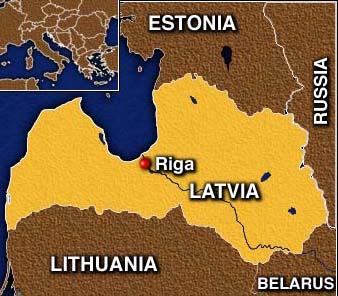Baltic economic picture gets even grimmer
 Riga - The economic gloom afflicting the Baltic states got several shades darker Tuesday with a fresh forecasts revising expectations downwards.
Riga - The economic gloom afflicting the Baltic states got several shades darker Tuesday with a fresh forecasts revising expectations downwards.
Until mid-2007 the so-called 'Baltic Tigers' of Estonia, Lithuania and Latvia recorded Europe's fastest growth rates, but their economies have stalled spectacularly in the wake of the global downturn.
According to a spring forecast from the Estonian Ministry of Finance, the economy in the smallest of the Baltic states will contract by 8.5 percent in 2009.
"Estonia is undoubtedly at a difficult time. At the same time this gives us a real opportunity to use the downturn to create a more efficient and more stable economy," said Estonian Finance Minister Ivari Padar.
An even bigger hit is likely to be suffered by neighbouring Latvia, according to Economics Ministry official Olegs Baranovs.
Briefing the cabinet of Prime Minister Valdis Dombrovskis, Baranovs said Latvian GDP would probably contract by more than the official 12 per cent forecast, reported the Baltic News Service.
According to a fresh report produced by the Economics and Finance ministries, Latvia's unemployment rate could hit 16 per cent by the end of the year.
"It is possible that, as a result of the global financial crisis, the decline in external demand will be much steeper than currently estimated ... Further dramatic cuts in lending and public expenditure would result in a sharp decline in investment and private consumption," the report said.
The new figures will add weight to Latvia's current attempts to renegotiate the terms of a 10-billion-dollar economic assistance package brokered by the International Monetary Fund.
According to the current agreement, Latvia's budget deficit must not exceed 5 per cent of GDP, but Prime Minister Dombrovskis is arguing that the worsening economic outlook makes such a target impossible and is asking for a 7 per cent cap instead.
On Monday, Lithuanian Finance Minister Algirdas Semeta revealed he expects a 10.5 per cent contraction in the largest of the Baltic economies this year.
"The bigger-than-predicted GDP decline will inevitably affect budget revenues," Semeta said. "So the government in completing the preparation of budget amendments designed to significantly reduce costs while ensuring the country's macroeconomic stability." dpa